The Limits of Science: Why Einstein Believed Science Needs the Humanities
We undoubtedly live during an age when our dominant educational institutions prioritize science and technology over the humanities. Such prioritization runs counter to the assessment of one of the greatest scientists in human history: Albert Einstein.
In 1905 Einstein completed his Ph.D. at the University of Zurich in Switzerland. He was 26 years old. That same year, Einstein published four pioneering scientific papers that brought about a paradigm shift in physics. In the span of about six months, Einstein published a paper on the photoelectric effect, arguing that light might be a particle and not a wave; another on Brownian motion, showing theoretical evidence for the actual existence of atoms; another formulating his theory of special relativity, contending that time is relative to observers while the speed of light is constant; and a fourth developing the idea that mass and energy are equivalent, as expressed in the equation “E = mc2.”
Ten years later Einstein developed the general theory of relativity explaining gravity as an effect rather than an independent force of its own. In 1921 he earned the Nobel Prize in Physics. He was forced to emigrate from Germany to the United States, in 1933, as Adolph Hitler ascended to power. He became a United States citizen in 1940.
Einstein’s success contradicts the popular claim that human labor is only motivated by financial compensation and narrow specialization. Einstein authored his four great works while working in a Swiss Patent Office. During this time, he regularly met with a circle of friends outside of work to discuss science and philosophical works by thinkers including David Hume. Much of Einstein’s work is, indeed, theoretical, deploying imaginative thought experiments devised during contemplative pauses in his daily work.
Why We Need Humanities in Education
In a 1952 letter, “Education for Independent Thought,” Einstein argued that the schooling system overemphasized specialized knowledge and underemphasized “independent critical thinking” and humanistic, moral wisdom. He insisted that only those who understood fundamental human values could be counted as truly educated. “It is essential that the student acquire an understanding of and a lively feeling for values. He must acquire a vivid sense of the beautiful and of the morally good.”
Einstein also believed that over-specialization, a growing factor during his lifetime, and narrowly technical competencies tended to produce lopsided thought and stifled humanity. A person strictly educated in a specialized field who lacked moral sensitivities and understanding “more closely resembles a well-trained dog than a harmoniously developed person.”
A complete education was a holistic education that enabled us to understand “the motives of human beings, their illusions, and their sufferings.” The goal of such knowledge, for Einstein, was not strategic advantage, profit, or some other instrumentalized objective, but to form a “proper relationship to individual fellow-men and to the community.” The aim, in other words, was simply to be more human.
Einstein explicitly recommended the study of the “humanities” to facilitate deeper connection to humanity and avoid lopsided technological-intellectual development. But he clarified that by humanities he did not mean just “dry” studies in history and philosophy, but also “personal contact with those who teach, not or at least not in the main—through textbooks.” Einstein believed that textbooks could not take the place of human-to-human connection and learning just as some of us today intuit a significant loss in the “virtualization” of our educational and more general social practices. Neither computers, Chat boxes, or books can take the place of human beings in authentic dialogue and creative communion.
Einstein believed that the humanities offered an antidote to cultural myopia. In a separate letter dated February 29, 1952, Einstein wrote that great authors of antiquity offered significantly more insight than many of the comparably shallow works published in current newspapers and books.
“Somebody who reads only newspapers and at best books of contemporary authors looks to me like an extremely nearsighted person who scorns eyeglasses. He is completely dependent on the prejudices and fashions of his times, since he never gets to see or hear anything else. And what a person thinks on his own without being stimulated by the thoughts and experiences of other people is even in the best case rather paltry and monotonous.”
One can only imagine what Einstein would think of our compulsive turn to screens and phone apps that crowd out our own reflective thinking, today; or how often we freely pass up opportunities to encounter and contemplate profound works of the past.
Einstein’s thinking resounds Henry David Thoreau’s criticism of the mass media of his day. Writing about 90 years before Einstein, Thoreau argued that everyday conversation had grown increasingly shallow and inauthentic. The culprit, he contended, was the turn to the scandals and sensationalism in newspapers and person-to-person gossip. “The news we hear,” wrote Thoreau, “for the most part, is not news to our genius. It is the stalest repetition.”
Above all, the obsession with daily trends and conflicts led people away from their “inward and private” life, argued Thoreau, leaving little room for genuine inward reflection and independent thought.
“I believe that the mind can be permanently profaned by the habit of attending to trivial things, so that all our thoughts shall be tinged with triviality.”
Thoreau advised us to be more discerning guardians of our curious minds. We would do better to prioritize fundamental human principles and timeless insight over the ebb and flow of current events.
“We should treat our minds…as innocent and ingenuous children, whose guardians we are, and be careful what objects and what subjects we thrust on their attention. Read not the Times. Read the Eternities.”
He added, “Even the facts of science may dust the mind by their dryness, unless they are… rendered fertile by the dews of fresh and living truth.” This final point—one some lovers of the sciences might consider a blasphemy—pairs well with Einstein’s own view that non-scientific humanistic values enlivened and gave meaning to the facts of the world.
The Amorality of Science
In “Why Socialism?,” published in 1949, Einstein presented readers with his case for why a capitalism economic system was inadequate for a truly humane world. He believed the “crippling of individuals” to be the “worst evils of capitalism.”
In making his case, Einstein urged readers not to rely too heavily upon science to answer social problems. At its best, science “can supply the means by which to attain certain ends,” he wrote,” but it “cannot create ends and, even less, instill them in human beings.” He also insisted that we not presume a special class of “experts” are singularly capable of determining how best to organize society.
In his 1948 letter, “Religion and Science: Irreconcilable?,” published in The Christian Register, Einstein explained that science is a method of inquiry aimed at obtaining knowledge and facilitating action. Science, he wrote, could be defined as “methodical thinking directed toward finding regulative connections between our sensual experiences.” As with most tools, however, science is morally aimless—amoral. Thus, science has and must be guided and constrained by ethical principles that originate from outside of empirical analysis.
Historically, religion has been the area of human knowledge and experience explicitly concerned with human values and visions of purpose. In a June 1948, Einstein explained that religious traditions have utilized mythic, symbolic expression to deal with “goals and evaluations,” “the emotional foundation of human thinking and acting,” and to establish “ideals for the individual and communal life.”
Einstein acknowledged that religious traditions can, at times, conflict with scientific knowledge, particularly when religious narratives contain “dogmatically fixed statements on subjects which belong in the domain of science.” Einstein rejected the idea of a personal God as irrational but believed that the ethical contemplation and guidance that had long been the domain of religion gave meaning and direction to scientific inquiry.
Facts without Meaning
In January 1951 Albert Einstein’s sent a letter, “The Need for Ethical Culture” to the Ethical Culture Society in New York. The letter was written for and read at the commemoration of the organization’s 75th anniversary.
The full text of Einstein’s letter on “Ethical Culture” is provided at the end of this post.
The Ethical Culture Society was founded in 1876 by Columbia University philosophy professor, Dr. Felix Adler, in an attempt to overcome the bridge the moral gap between agnostics, atheists, and adherents to various religious beliefs. Adler advanced a vision of ethics that transcended particular ethnic or cultural groupings. His effort facilitated the disentanglement of religion and ethics as we increasingly experience the subjects, today.
In his letter to the organization, Einstein wrote that we are mistaken in believing that “the practical and factual”—the means of life—are capable of supplanting ethical values.
“I am not thinking so much of the dangers with which technical progress has directly confronted mankind, as of the stifling of mutual human considerations by a ‘matter-of-fact’ habit of thought which has come to lie like a killing frost upon human relations.”
Such a thought may seem strange to many of us as we confront a world where acknowledging empirically verified facts has never been more important. Given the growing tendency among some to deny facts, without good reason, we can be forgiven for responding defensively, at first glance, to Einstein’s critique. But a second look helps us understand the vital importance of this criticism.
We must understand and acknowledge facts before making intelligent decisions in our personal, professional, or public lives. But facts, alone, do not determine what is to be done about them.
Consider that Rev. Dr. Martin Luther King, Jr. received constant credible threats to his life. These threats were made in direct response to his social justice activism. But what did these facts dictate should be done by Rev. King? Did they dictate, “Therefore, Rev. King should have stopped his social justice activism”? This would follow if he adopted the ethical principle that preservation of one’s individual life is always the greatest priority. This conclusion would not follow, however, if the principle was, the protection and defense of human dignity is a cause worthy of risking one’s life for.
We could easily imagine a scenario where a person undertakes a life-threatening activity to save another person’s life: a parent dives into a hail of bullets to save their child. Knowing the situation is dangerous and imperils one’s life is important. But those facts do not generate a determinate answer to the question, what is to be done? This can only be answered in consultation with our priorities—our principles, our values, our purpose.
Einstein’s criticism of facts points to the importance of moral feeling and reminds us of John Stuart Mill’s insight, from On Liberty (1859):
“Very few facts are able to tell their own story, without comments to bring out their meaning.”
Facts are lifeless on their own. They are animated, only, by our values: beliefs about what is good or bad, important, less important, and unimportant.
Values are constantly shaping our thinking and decision making. Yet they are often undisclosed, hidden behind the high walls of common sense and popular belief. We tend to unconsciously permit dominant cultural values to dictate the meaning of the facts of our lives. As such, we relinquish our quintessential human agency.
We might respond that nothing more needs to be said, for example, about a bullet in the head. We know perfectly well what such an event means. But such a view misses the target of Einstein’s insight. Was the bullet fired by a thief during a robbery? Was the bullet fired during an unjust invasion of another’s nation? Was the bullet fired in self-defense during a home invasion? Was the bullet fired to prevent an act of domestic violence? Even with such context established we still aren’t able to draw any significant determination about whether the action was right or wrong, justified or unjustified, until a statement of value is added.
If the bullet was fired in genuine self-defense, and we believe that people are entitled to use such means in self-defense, then the action is morally accepted. If we believe that violence, in any form, is always wrong, then we will judge the action as immoral. Our values impress meaning or significance upon our sensory experiences, informing our judgment about what to do with and about them.
To put the matter directly: values guide us to a purpose—a cause, a meaning—beyond simply surviving. As the fourth-century BCE Chinese philosopher, Mencius, explained, though we all wish to live, there are some costs which a person of principle will not pay even to avoid death.
“If there is nothing a man wants more than life, then why should he have scruples about any means, so long as it will serve to keep him alive? If there is nothing a man loathes more than death, then why should he have scruples about any means, so long as it shows him the way to avoid trouble? Yet there are ways of remaining alive and ways of avoiding death to which a man will not resort. In other words, there are things a man wants more than life and there are also things he loathes more than death” (A6.10).
Each day we are tasked with making countless decisions about what is important and what is not. But something’s importance can only be determined in reference to one or more intrinsic values. To say that it is important to go to work because you have to make money is to pass the buck on the bigger question: what is the importance of making money? The answer might be something simple like, to buy this or that product. But again, the buck is passed. To get to the bottom or rather the heart of our choices and manner of living we must identify the supreme values that guide us to choose or prioritize this over that.
Erich Fromm made a similar point in his 1941 book, Escape From Freedom (1941). Like Einstein and Thoreau, Fromm criticized schools’ overemphasis on “knowledge of facts” in place of original, critical thinking skills.
“The pathetic superstition prevails that by knowing more and more facts one arrives at knowledge of reality. Hundreds of scattered and unrelated facts are dumped into the heads of students; their time and energy are taken up by learning more and more facts so that there is little left for thinking. To be sure, thinking without a knowledge of facts remains empty and fictitious; but ‘information’ alone can be just as much an obstacle to thinking as the lack of it.”
To know what to do about a given fact, to determine what it means in relation to the wider world of empirical truths, that fact must be viewed through the lens of clearly defined purpose. Uncoordinated facts, by themselves, leave us in what William James described as a “blooming, buzzing confusion.” Information untethered from human values results in an inharmonious cacophony—noise, not to mention potentially wasted time and energy.
The Primacy of Ethics
According to Einstein, scientific knowledge was insufficient for the maintenance of a healthy and humane society. Ethical values need to be at the center of all human projects. Ethical culture was necessary for the “salvation of humanity,” he wrote, but “no science can save us” as we pursue the establishment of “an ethical-moral configuration of our common life.”
The goal of human life entails more than intellectually “understanding” one another, Einstein wrote, it also requires “sympathetic feeling in joy and in sorrow.” Cultivating moral concern is the task “of religion when it has been purified of the elements of superstition.” Considering his definition of religion, discussed above, Einstein’s point is that moral values are not factual claims. The claim that all people have dignity is not one we can test, empirically, though it is certainly an insight we can gain through reason, experience and authentic encounters with one another. Einstein also believed that art was a vital source of moral wisdom.
“Fulfillment of the moral and esthetic side is a goal which lies closer to the preoccupations of art than it does to those of science.”
The reason for Einstein’s belief, here, is that the greatest art is self-justifying rather than a means to some distant end. Just as art, at its best, is often concerned with intrinsic value—that which is good for its own sake—so, too, are the highest moral principles about what is good for their own sake, without transactional or transferrable value.
Humanistic psychologist Abraham Maslow, best-known for his theory of the hierarchy of needs, criticized the diminishment of values in objective analysis including scientific research, educational institutions, and the broader society. Following Einstein’s earlier criticisms, Maslow wrote, in Religions, Values, and Peak-Experiences (1964):
“Any philosophy that permits facts to become amoral, totally separated from values, makes possible in theory at least the Nazi physician ‘experimenting’ in the concentration camps, or the spectacle of captured German engineers working devotedly for whichever side happened to capture them.”
As with Einstein, Maslow’s aim was not to revitalize an understanding and appreciation of ethics by reinstituting conventional, dogmatic religious practice. Both men rejected the idea of a personal God. They believed that moral ideas, though non-factual in the way that abstract mathematical concepts are non-factual, could nevertheless be objectively examined and assessed through critical and creative analysis. As a lifelong student of the humanities, Einstein, understood the vital role they would need to continue playing in nurturing contemplation, feeling, and exemplification of values in human life. Science without humanities would be facts without meaning, rhyme without reason, life without love.
If you enjoyed this post please share it with others and like it by clicking the heart icon. Be sure to subscribe if you haven’t already.
Learn More about Einstein
“The Need for Ethical Culture,” by Albert Einstein
I feel the need of sending my congratulations and good wishes to your Ethical Culture Society on the occasion of its anniversary celebration. True, this is not a time when we can regard with satisfaction the results which honest striving on the ethical plane has achieved in these seventy-five years. For one can hardly assert that the moral aspect of human life in general is today more satisfactory than it was in 1876.
At that time the view obtained that everything was to be hoped for from enlightenment in the field of ascertainable scientific fact and from the conquest of prejudice and superstition. All this is of course important and worthy of the best efforts of the finest people. And in this regard much has been accomplished in these seventy-five years and has been disseminated by means of literature and the state. But the clearing away of obstacles does not by itself lead to an ennoblement of social and individual life. For along with this negative result, a positive aspiration and effort for an ethical-moral configuration of our common life is of overriding importance. Here no science can save us. I believe, indeed, that overemphasis on the purely intellectual attitude, often directed solely to the practical and factual, in our education, has led directly to the impairment of ethical values. I am not thinking so much of the dangers with which technical progress has directly confronted mankind, as of the stifling of mutual human considerations by a “matter-of-fact” habit of thought which has come to lie like a killing frost upon human relations.
Fulfillment of the moral and esthetic side is a goal which lies closer to the preoccupations of art than it does to those of science. Of course, understanding of our fellow-beings is important. But this understanding becomes fruitful only when it is sustained by sympathetic feeling in joy and in sorrow. The cultivation of this most important spring of moral action is that which is left of religion when it has been purified of the elements of superstition. In this sense, religion forms an important part of education, where it receives far too little consideration, and that little not sufficiently systematic.
The frightful dilemma of the political world situation has much to do with this sin of omission on the part of our civilization. Without ‘ethical culture’ there is no salvation for humanity.
Source: Albert Einstein, “The Need for Ethical Culture,” in Ideas and Opinions. New York: Modern Library, 1994.


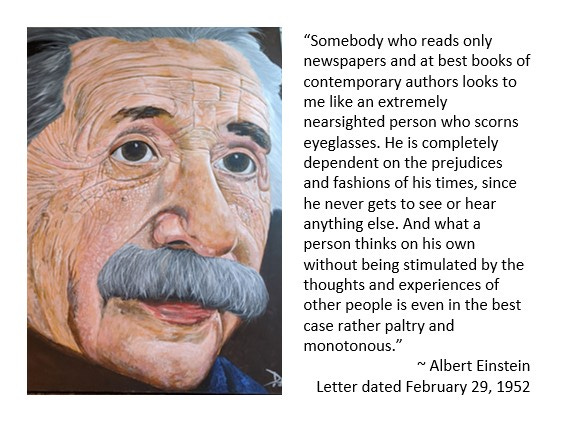
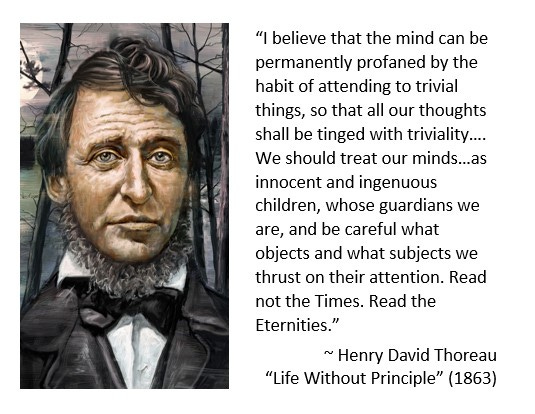
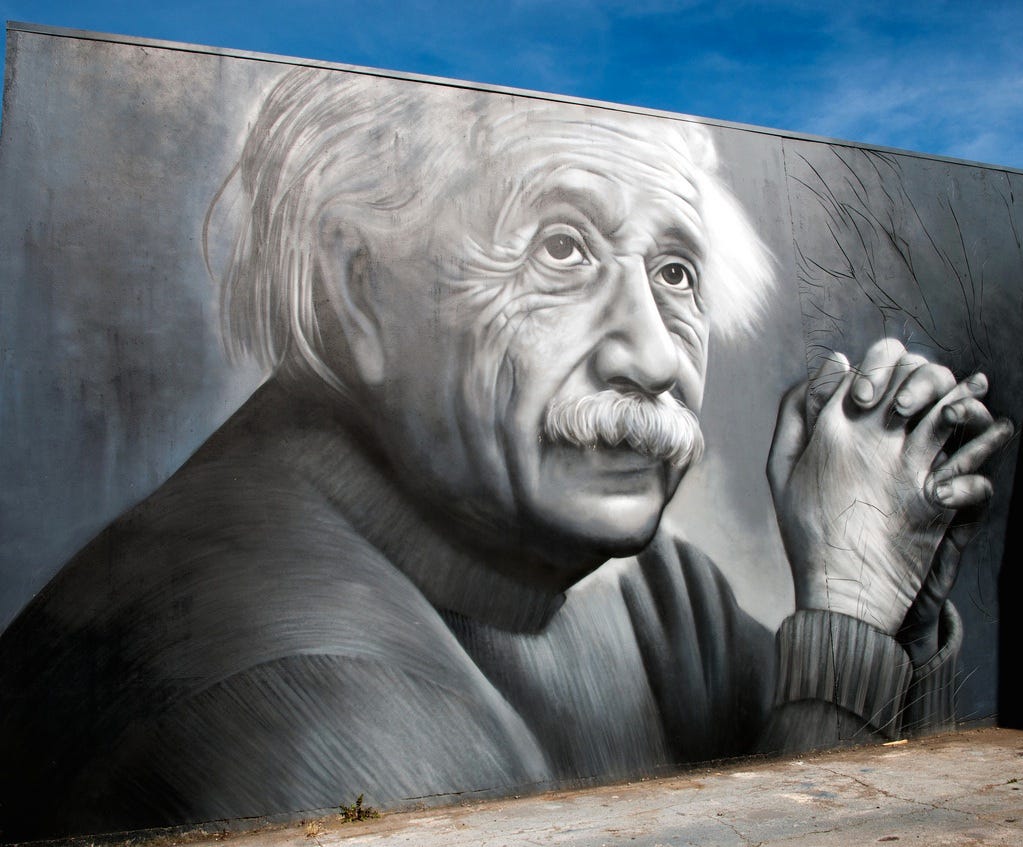
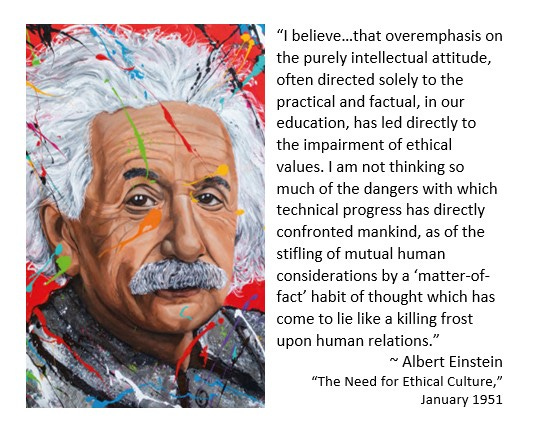
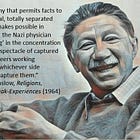

thanks for the wonderful write up